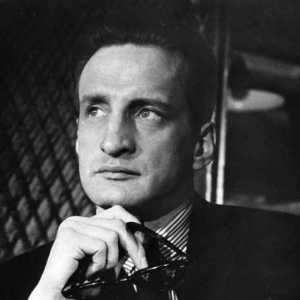George Campbell Scott (October 18, 1927 – September 22, 1999) was an American actor, director, and producer who had a celebrated career on both stage and screen. With a gruff demeanor and commanding presence, Scott became known for his portrayal of stern, but complex, authority figures such as prosecutor Claude Dancer in Anatomy of a Murder, General Buck Turgidson in Stanley Kubrick's Dr. Strangelove, Herbert Bock in The Hospital, Ebenezer Scrooge in A Christmas Carol, Lt. Kinderman in The Exorcist III, and General George S. Patton in the biopic Patton, which won him the Academy Award for Best Actor. Described by The Guardian as "a battler and an actor of rare courage", his performances won him widespread recognition and numerous other accolades, including a Golden Globe, a Genie Award, and two Primetime Emmys.
Scott first distinguished himself as a stage actor in New York, both in Off-Broadway and Broadway productions. He earned the first of four Oscar nominations for only his second film role, in Anatomy of a Murder, and soon achieved screen stardom through a series of lead roles in films like The Hustler (1961), The List of Adrian Messenger (1963), Dr. Strangelove (1964), and The Bible: In the Beginning (1966). Though he won the Best Actor Oscar for playing the titular role in Patton, he became the first actor to refuse the award, having warned the Academy of Motion Picture Arts and Sciences months in advance that he would do so on philosophical grounds if he won. Scott believed that every dramatic performance was unique and could not be compared to others.
Scott continued to maintain a prominent stage career even as his film stardom waned, and by the end of his career he had accrued five Tony nominations, including four for Best Actor in a Play, earning his final nomination for playing Matthew Harrison Brady in the 1996 Broadway revival of Inherit the Wind. He directed several of his own films and plays and often collaborated with his wives Colleen Dewhurst and Trish Van Devere.
Early life
George Campbell Scott was born, the younger of two siblings, on October 18, 1927, on a kitchen table in the modest Wise, Virginia, home of his parents, George Dewey Scott (1902–1988) and Helena Agnes (née Slemp; 1904–1935). His mother was the first cousin, once removed of Republican Congressman C. Bascom Slemp. His maternal grandfather was a local jurist, Judge Campbell Slemp. His mother died just before his eighth birthday, and he was raised by his father, an executive at Buick. Scott's original ambition was to be a writer like his favorite author, F. Scott Fitzgerald. While attending Redford High School in Detroit, he wrote many short stories, none of which were published. He tried on many occasions to write a novel, but never completed one to his own satisfaction.
After high school, Scott enlisted in the United States Marine Corps, serving from 1945 to 1949. He was assigned to 8th and I Barracks in Washington, D.C., and his primary duty was serving as honor guard at military funerals at Arlington National Cemetery. He later said that during his duty at Arlington, " pick up a solid drinking habit that stayed with me from then on."
Following military service, Scott enrolled in the University of Missouri on the G.I. Bill where he majored in journalism and then became interested in drama. His first public appearance on stage was as the barrister in a university production of Terence Rattigan's The Winslow Boy, directed by H. Donovan Rhynsburger. During rehearsals for that show, he made his first stage appearance—in a student production of Noël Coward's Hands Across the Sea, directed by Jerry V. Tobias. He graduated from the university in 1953 with degrees in English and theater.
